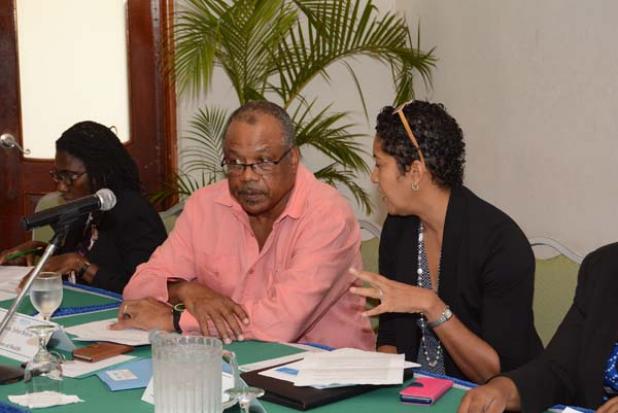
Minister of Health John Boyce shares a word with Sub-regional Programme Coordinator PAHO/WHO Jessie Schutt-Aine during the opening ceremony of the Subregional Workshop on Alcohol, Tobacco and Sugar-Sweetened Beverages Taxation.
Ministry considering ban on sugary drinks in schools
IN an attempt to put a dent in childhood obesity statistics in Barbados, some firm measures are being contemplated by the Ministry of Health.
Word of this comes from Health Minister John Boyce, who says this could include imposing a ban on unhealthy drinks in the nation’s schools, against the backdrop of rising level of obesity in the school population.
He was at the time addressing the Caribbean Subregional Workshop on Alcohol, Tobacco and Sugar-Sweetened Beverages Taxation at the Accra Beach Hotel yesterday morning.
According to the Minister, “The WHO Global School Health Survey (GSHS) 2012 in Barbados indicated the prevalence of overweight and obesity to be 31.5 per cent and 14.4 per cent respectively. Girls were at a slightly higher rate of overweight and obesity when compared to boys. The survey also indicated that levels of physical activity and exercise and consumption of healthy diets were consistently low.”
It is for this reason, the Minister revealed, that his Ministry is currently preparing a set of policy options to address the marketing of unhealthy foods to children while they are at school.
“Consideration would be given to a ban on the sale and/or promotion of sugar-sweetened beverages on the premises of schools. These measures are to be considered by the Inter-Ministerial Committee on NCDs and subsequently, the full Cabinet of Barbados.”
The Minister lamented that even though public health practitioners and other entities have been warning against the dangers of unhealthy lifestyle practices, and while education is still an important component in the strategy, officials are not convinced it is enough to bring about behavioural change.
He stressed that a multi-sectoral approach will be needed to tackle these problems, adding that taxation would not be a “magic bullet”.
While highlighting the worrying numbers in the Caribbean, particularly as it relates to premature death, Minister Boyce told the participants of the workshop that while the evaluation of the Barbados experience with the tax on sugar-sweetened beverages is still ongoing, he believes that the imposition of such a tax sends a strong signal to the population and to the world of the island’s willingness to take action to address the root causes of the obesity problem.
He acknowledged that such measures will always meet a degree of opposition from some quarters.
“However, as a Government, our role is to protect the health and well-being of citizens. Therefore, we must use whatever legal and policy measures are at our disposal to make it easier for people to choose a healthy snack, to eat in a smoke-free environment in a restaurant or for our children to have access to healthy meals in and around schools,” he said.
The Minister told the participants of the workshop that it is hoped that the meetings will include greater use of policy and legislative measures in response to the NCD crisis.
“I am confident that you will be able to provide guidance that will help your governments to be creative and decisive in their decision-making,” he said. (JH)
